Comprehensive Financial Analysis Report of Big Bang Pty Ltd
VerifiedAdded on 2024/06/28
|14
|1727
|479
Report
AI Summary
This report provides a detailed financial statement analysis of Big Bang Pty Ltd, focusing on key financial ratios such as current ratio, quick ratio, and turnover ratios. The analysis assesses the company's ability to meet its short-term obligations, comparing its performance in 2018 and 2019. Additionally, the report discusses the financial transactions of Green Apple Limited to identify income and revenue streams, and evaluates the short-term solvency of ABC Company and XYZ Company for a loan application, using net asset value method for company valuation. The findings indicate the importance of maintaining optimal financial ratios to ensure short-term solvency and attract potential investors or lenders. Desklib offers a range of similar financial analysis reports and study tools for students.
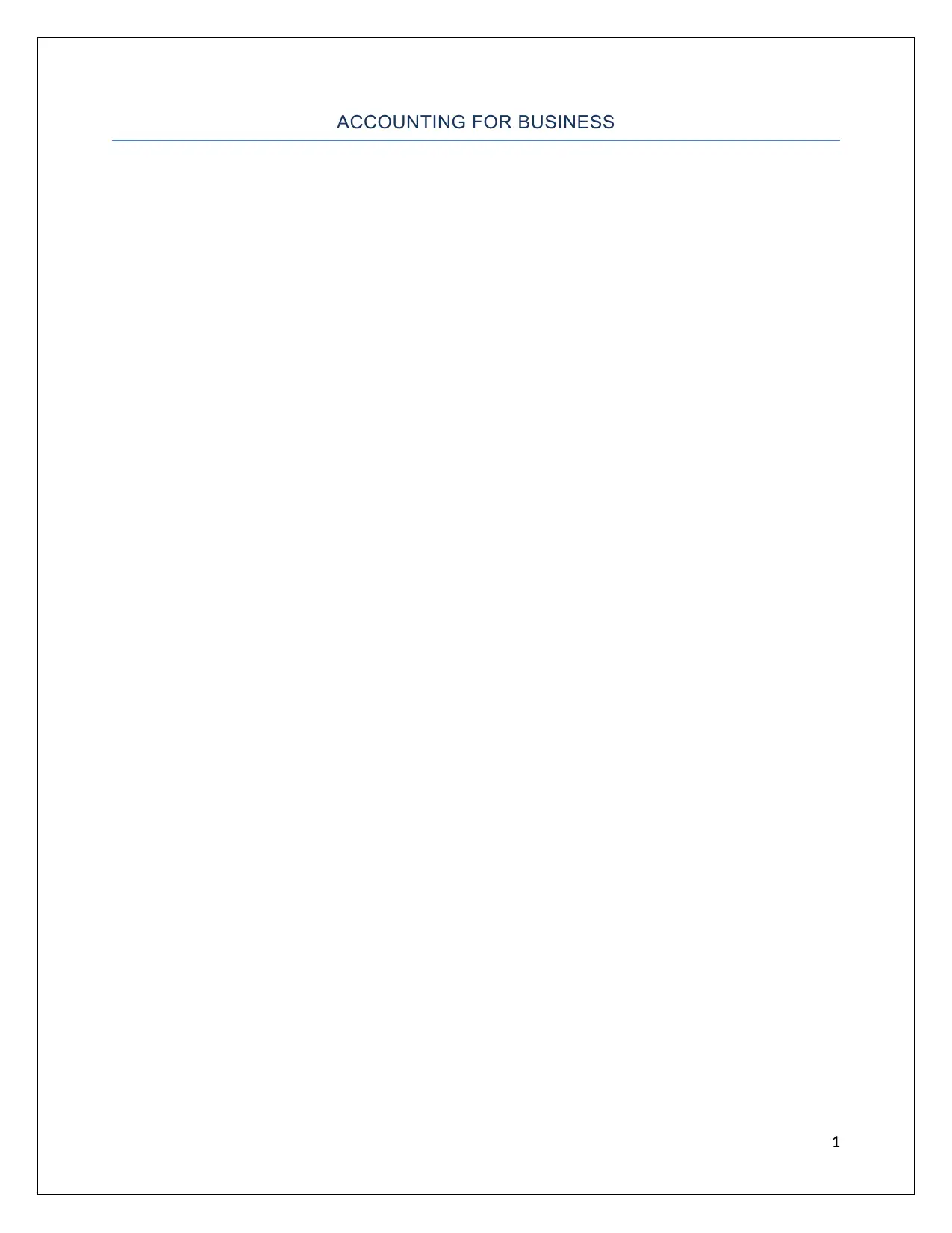
ACCOUNTING FOR BUSINESS
1
1
Paraphrase This Document
Need a fresh take? Get an instant paraphrase of this document with our AI Paraphraser
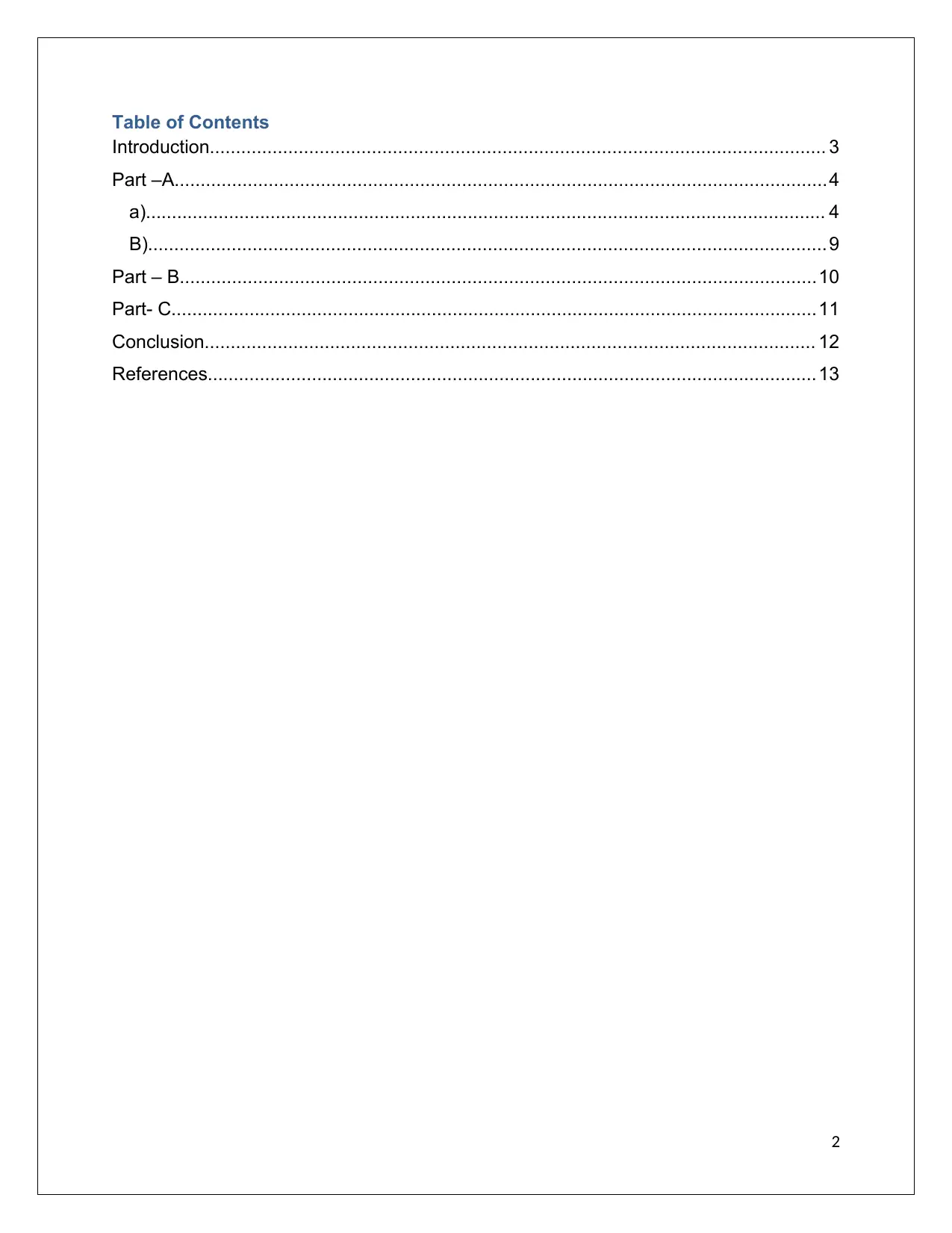
Table of Contents
Introduction...................................................................................................................... 3
Part –A.............................................................................................................................4
a)................................................................................................................................... 4
B)..................................................................................................................................9
Part – B..........................................................................................................................10
Part- C............................................................................................................................11
Conclusion..................................................................................................................... 12
References.....................................................................................................................13
2
Introduction...................................................................................................................... 3
Part –A.............................................................................................................................4
a)................................................................................................................................... 4
B)..................................................................................................................................9
Part – B..........................................................................................................................10
Part- C............................................................................................................................11
Conclusion..................................................................................................................... 12
References.....................................................................................................................13
2
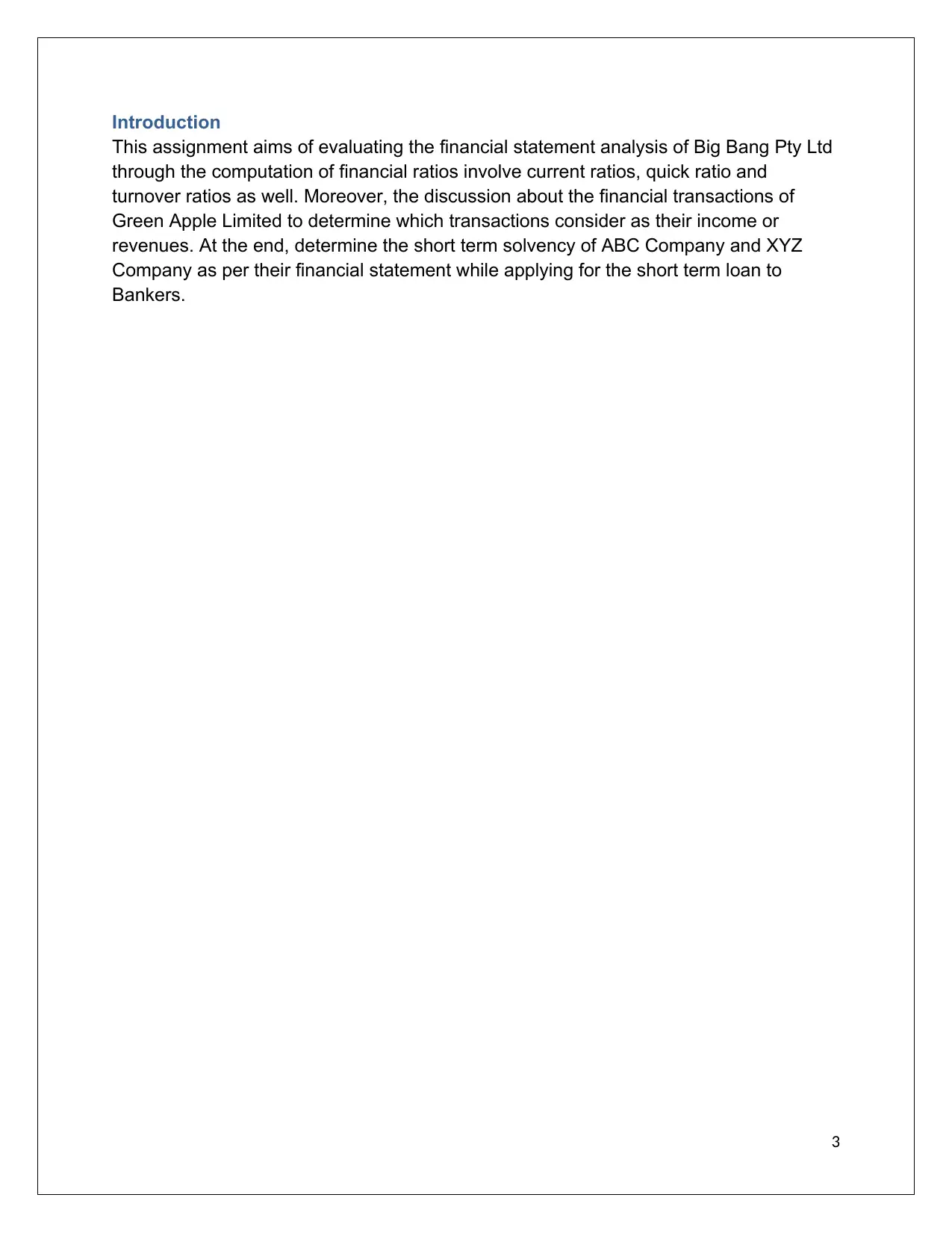
Introduction
This assignment aims of evaluating the financial statement analysis of Big Bang Pty Ltd
through the computation of financial ratios involve current ratios, quick ratio and
turnover ratios as well. Moreover, the discussion about the financial transactions of
Green Apple Limited to determine which transactions consider as their income or
revenues. At the end, determine the short term solvency of ABC Company and XYZ
Company as per their financial statement while applying for the short term loan to
Bankers.
3
This assignment aims of evaluating the financial statement analysis of Big Bang Pty Ltd
through the computation of financial ratios involve current ratios, quick ratio and
turnover ratios as well. Moreover, the discussion about the financial transactions of
Green Apple Limited to determine which transactions consider as their income or
revenues. At the end, determine the short term solvency of ABC Company and XYZ
Company as per their financial statement while applying for the short term loan to
Bankers.
3
⊘ This is a preview!⊘
Do you want full access?
Subscribe today to unlock all pages.

Trusted by 1+ million students worldwide
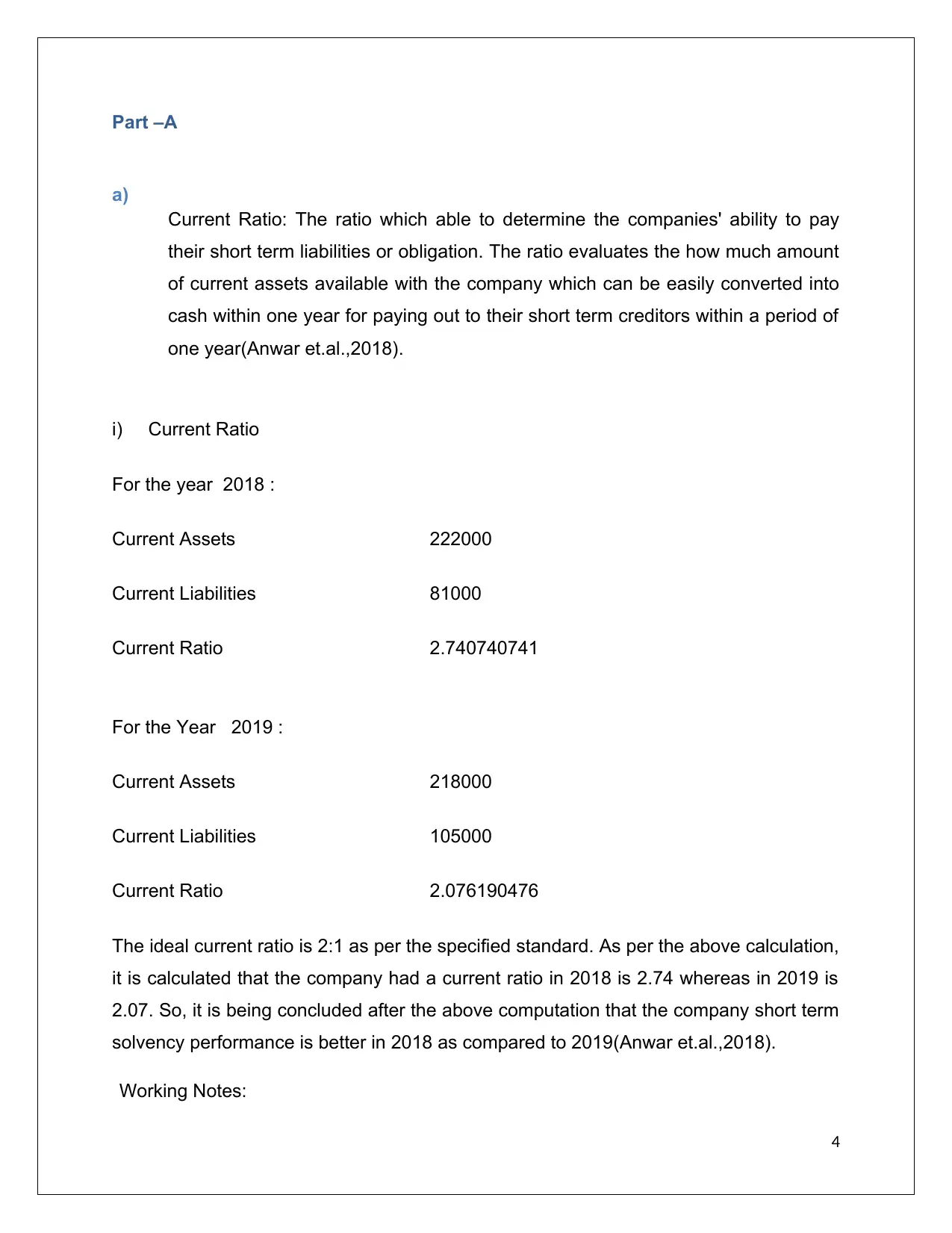
Part –A
a)
Current Ratio: The ratio which able to determine the companies' ability to pay
their short term liabilities or obligation. The ratio evaluates the how much amount
of current assets available with the company which can be easily converted into
cash within one year for paying out to their short term creditors within a period of
one year(Anwar et.al.,2018).
i) Current Ratio
For the year 2018 :
Current Assets 222000
Current Liabilities 81000
Current Ratio 2.740740741
For the Year 2019 :
Current Assets 218000
Current Liabilities 105000
Current Ratio 2.076190476
The ideal current ratio is 2:1 as per the specified standard. As per the above calculation,
it is calculated that the company had a current ratio in 2018 is 2.74 whereas in 2019 is
2.07. So, it is being concluded after the above computation that the company short term
solvency performance is better in 2018 as compared to 2019(Anwar et.al.,2018).
Working Notes:
4
a)
Current Ratio: The ratio which able to determine the companies' ability to pay
their short term liabilities or obligation. The ratio evaluates the how much amount
of current assets available with the company which can be easily converted into
cash within one year for paying out to their short term creditors within a period of
one year(Anwar et.al.,2018).
i) Current Ratio
For the year 2018 :
Current Assets 222000
Current Liabilities 81000
Current Ratio 2.740740741
For the Year 2019 :
Current Assets 218000
Current Liabilities 105000
Current Ratio 2.076190476
The ideal current ratio is 2:1 as per the specified standard. As per the above calculation,
it is calculated that the company had a current ratio in 2018 is 2.74 whereas in 2019 is
2.07. So, it is being concluded after the above computation that the company short term
solvency performance is better in 2018 as compared to 2019(Anwar et.al.,2018).
Working Notes:
4
Paraphrase This Document
Need a fresh take? Get an instant paraphrase of this document with our AI Paraphraser
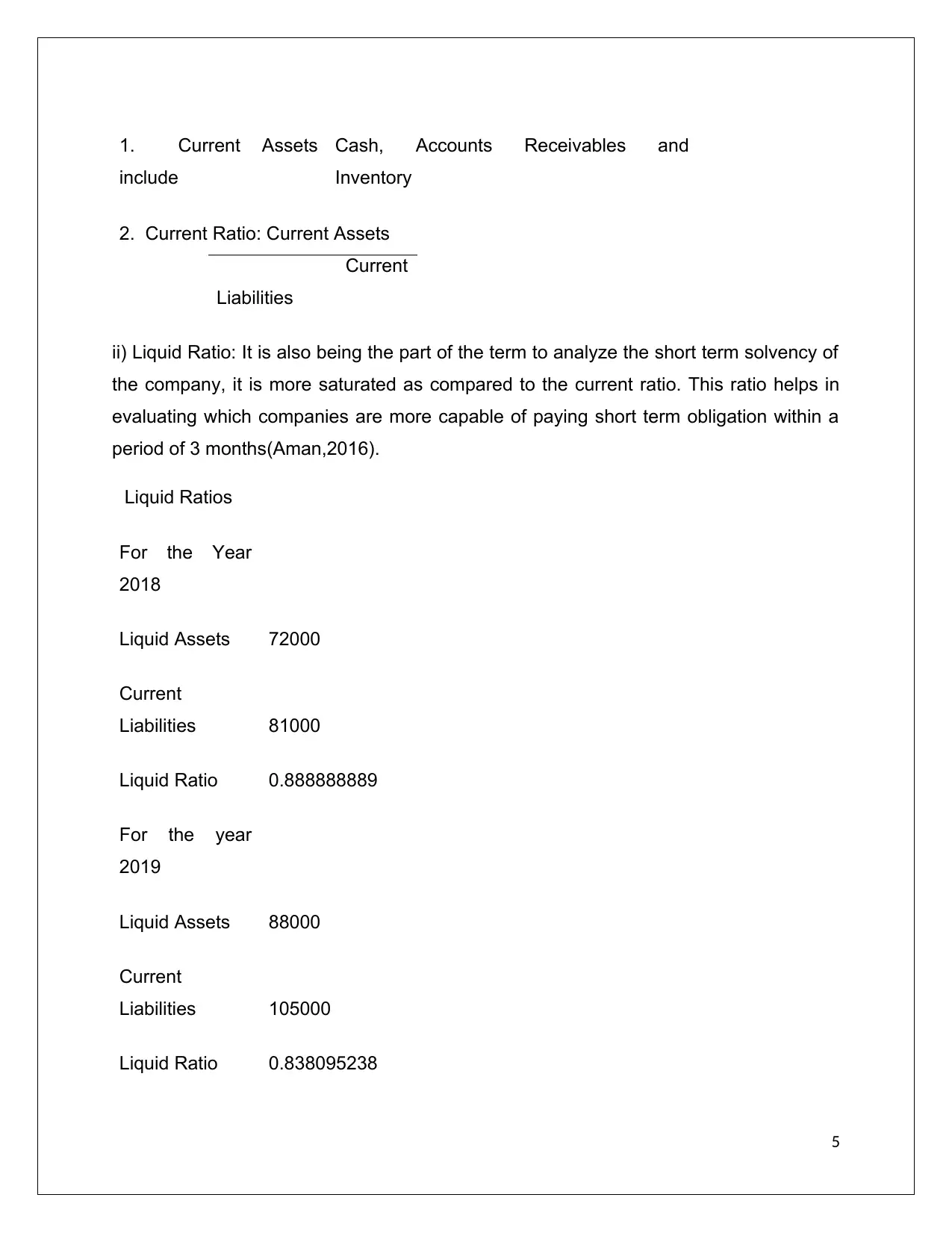
1. Current Assets
include
Cash, Accounts Receivables and
Inventory
2. Current Ratio: Current Assets
Current
Liabilities
ii) Liquid Ratio: It is also being the part of the term to analyze the short term solvency of
the company, it is more saturated as compared to the current ratio. This ratio helps in
evaluating which companies are more capable of paying short term obligation within a
period of 3 months(Aman,2016).
Liquid Ratios
For the Year
2018
Liquid Assets 72000
Current
Liabilities 81000
Liquid Ratio 0.888888889
For the year
2019
Liquid Assets 88000
Current
Liabilities 105000
Liquid Ratio 0.838095238
5
include
Cash, Accounts Receivables and
Inventory
2. Current Ratio: Current Assets
Current
Liabilities
ii) Liquid Ratio: It is also being the part of the term to analyze the short term solvency of
the company, it is more saturated as compared to the current ratio. This ratio helps in
evaluating which companies are more capable of paying short term obligation within a
period of 3 months(Aman,2016).
Liquid Ratios
For the Year
2018
Liquid Assets 72000
Current
Liabilities 81000
Liquid Ratio 0.888888889
For the year
2019
Liquid Assets 88000
Current
Liabilities 105000
Liquid Ratio 0.838095238
5
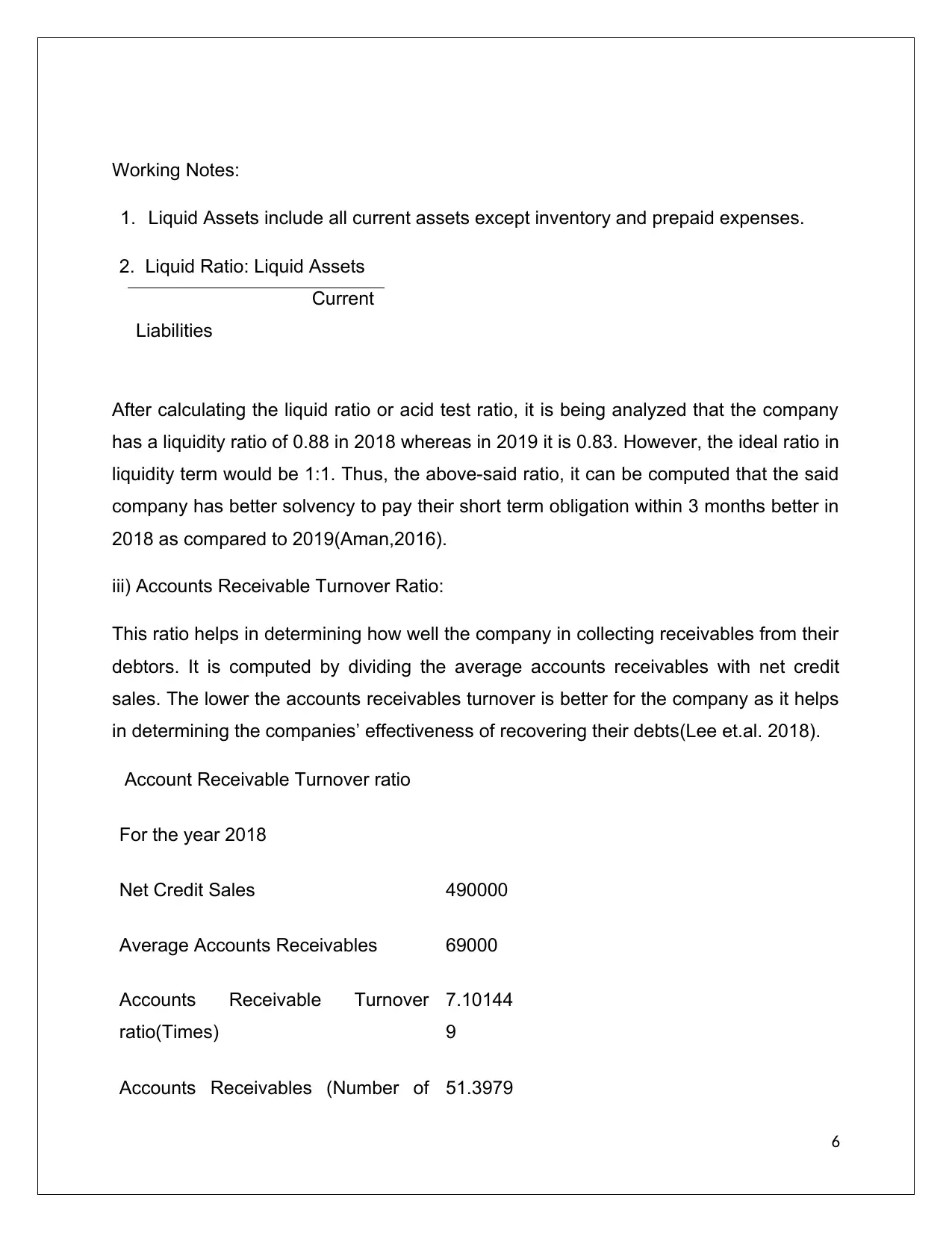
Working Notes:
1. Liquid Assets include all current assets except inventory and prepaid expenses.
2. Liquid Ratio: Liquid Assets
Current
Liabilities
After calculating the liquid ratio or acid test ratio, it is being analyzed that the company
has a liquidity ratio of 0.88 in 2018 whereas in 2019 it is 0.83. However, the ideal ratio in
liquidity term would be 1:1. Thus, the above-said ratio, it can be computed that the said
company has better solvency to pay their short term obligation within 3 months better in
2018 as compared to 2019(Aman,2016).
iii) Accounts Receivable Turnover Ratio:
This ratio helps in determining how well the company in collecting receivables from their
debtors. It is computed by dividing the average accounts receivables with net credit
sales. The lower the accounts receivables turnover is better for the company as it helps
in determining the companies’ effectiveness of recovering their debts(Lee et.al. 2018).
Account Receivable Turnover ratio
For the year 2018
Net Credit Sales 490000
Average Accounts Receivables 69000
Accounts Receivable Turnover
ratio(Times)
7.10144
9
Accounts Receivables (Number of 51.3979
6
1. Liquid Assets include all current assets except inventory and prepaid expenses.
2. Liquid Ratio: Liquid Assets
Current
Liabilities
After calculating the liquid ratio or acid test ratio, it is being analyzed that the company
has a liquidity ratio of 0.88 in 2018 whereas in 2019 it is 0.83. However, the ideal ratio in
liquidity term would be 1:1. Thus, the above-said ratio, it can be computed that the said
company has better solvency to pay their short term obligation within 3 months better in
2018 as compared to 2019(Aman,2016).
iii) Accounts Receivable Turnover Ratio:
This ratio helps in determining how well the company in collecting receivables from their
debtors. It is computed by dividing the average accounts receivables with net credit
sales. The lower the accounts receivables turnover is better for the company as it helps
in determining the companies’ effectiveness of recovering their debts(Lee et.al. 2018).
Account Receivable Turnover ratio
For the year 2018
Net Credit Sales 490000
Average Accounts Receivables 69000
Accounts Receivable Turnover
ratio(Times)
7.10144
9
Accounts Receivables (Number of 51.3979
6
⊘ This is a preview!⊘
Do you want full access?
Subscribe today to unlock all pages.

Trusted by 1+ million students worldwide
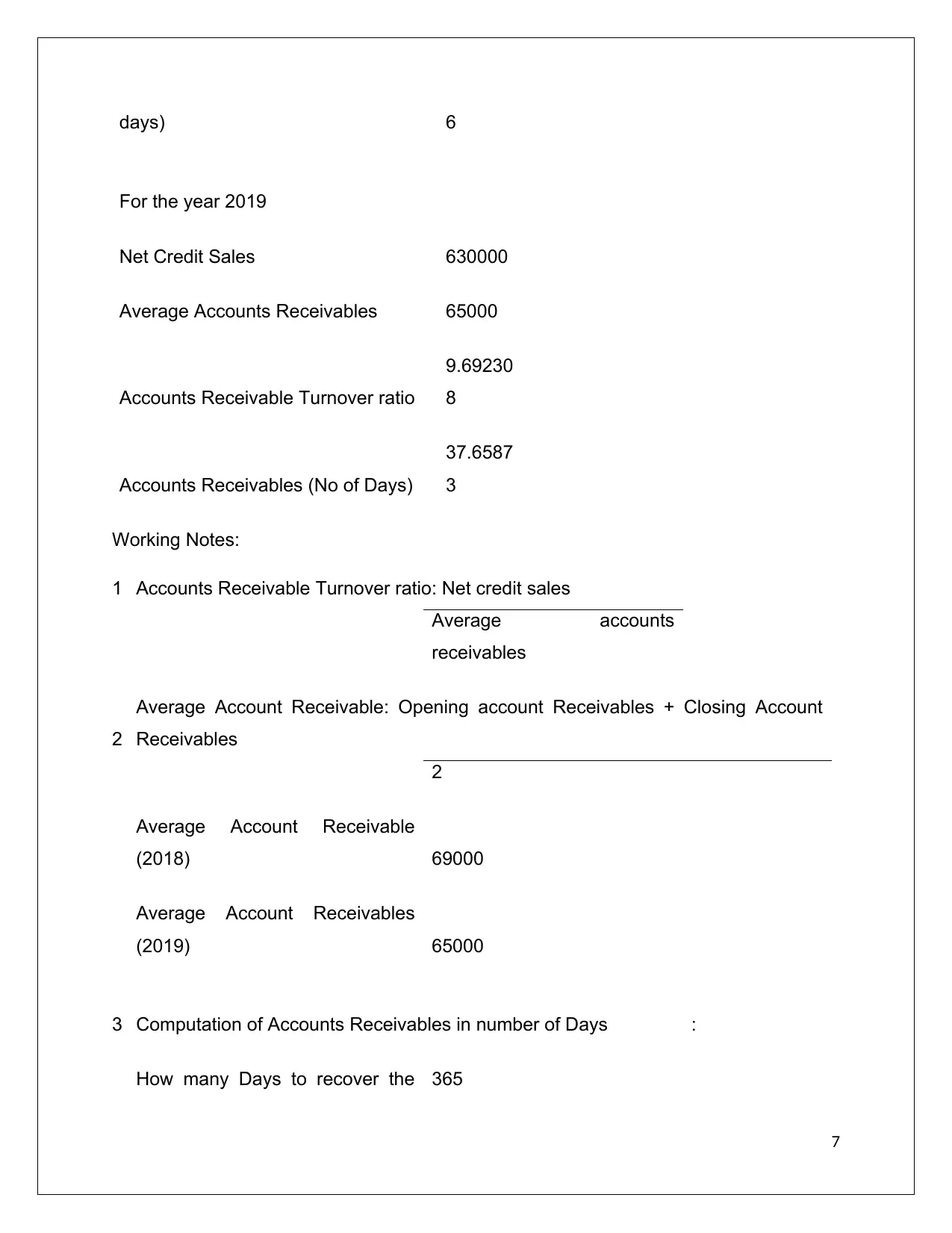
days) 6
For the year 2019
Net Credit Sales 630000
Average Accounts Receivables 65000
Accounts Receivable Turnover ratio
9.69230
8
Accounts Receivables (No of Days)
37.6587
3
Working Notes:
1 Accounts Receivable Turnover ratio: Net credit sales
Average accounts
receivables
2
Average Account Receivable: Opening account Receivables + Closing Account
Receivables
2
Average Account Receivable
(2018) 69000
Average Account Receivables
(2019) 65000
3 Computation of Accounts Receivables in number of Days :
How many Days to recover the 365
7
For the year 2019
Net Credit Sales 630000
Average Accounts Receivables 65000
Accounts Receivable Turnover ratio
9.69230
8
Accounts Receivables (No of Days)
37.6587
3
Working Notes:
1 Accounts Receivable Turnover ratio: Net credit sales
Average accounts
receivables
2
Average Account Receivable: Opening account Receivables + Closing Account
Receivables
2
Average Account Receivable
(2018) 69000
Average Account Receivables
(2019) 65000
3 Computation of Accounts Receivables in number of Days :
How many Days to recover the 365
7
Paraphrase This Document
Need a fresh take? Get an instant paraphrase of this document with our AI Paraphraser
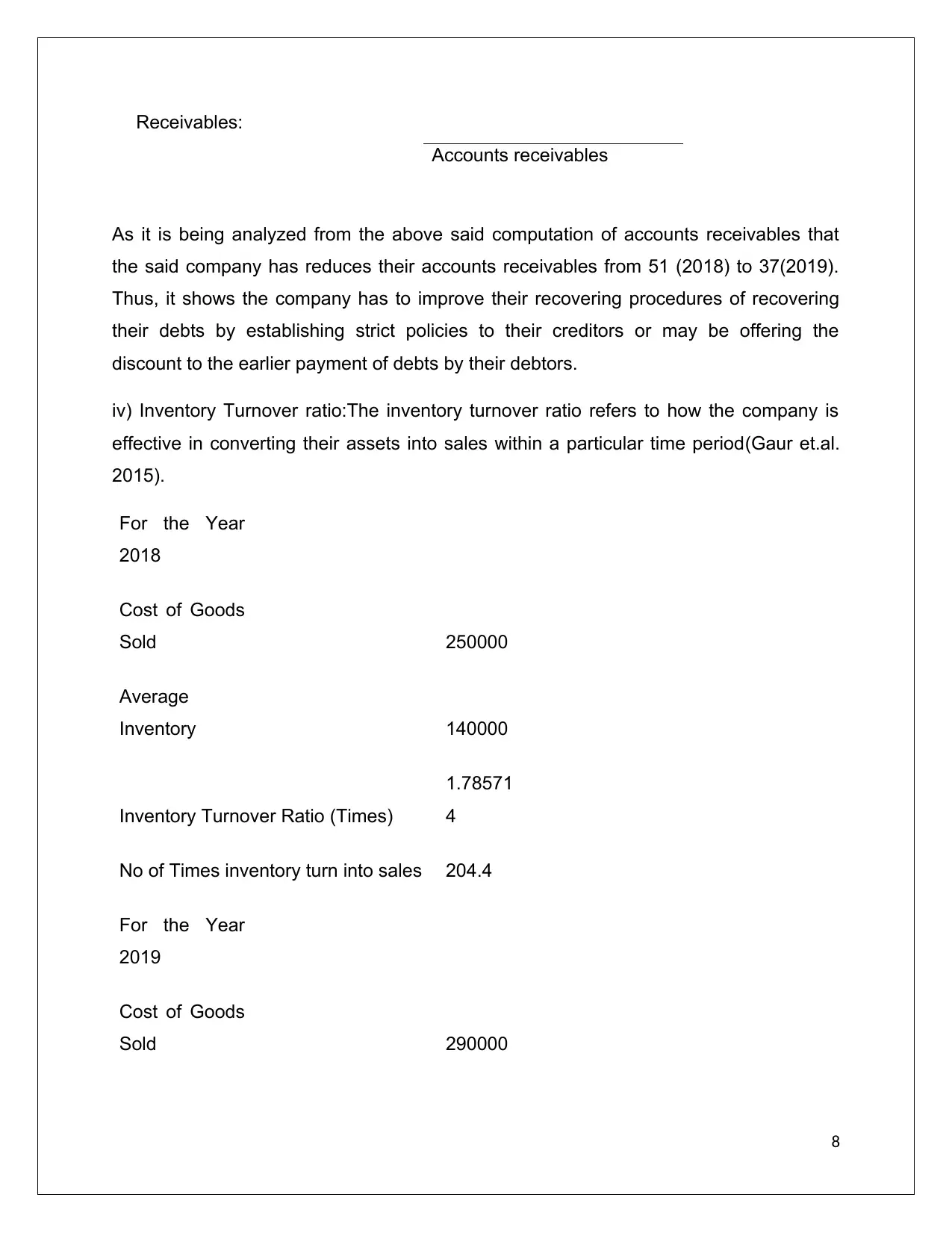
Receivables:
Accounts receivables
As it is being analyzed from the above said computation of accounts receivables that
the said company has reduces their accounts receivables from 51 (2018) to 37(2019).
Thus, it shows the company has to improve their recovering procedures of recovering
their debts by establishing strict policies to their creditors or may be offering the
discount to the earlier payment of debts by their debtors.
iv) Inventory Turnover ratio:The inventory turnover ratio refers to how the company is
effective in converting their assets into sales within a particular time period(Gaur et.al.
2015).
For the Year
2018
Cost of Goods
Sold 250000
Average
Inventory 140000
Inventory Turnover Ratio (Times)
1.78571
4
No of Times inventory turn into sales 204.4
For the Year
2019
Cost of Goods
Sold 290000
8
Accounts receivables
As it is being analyzed from the above said computation of accounts receivables that
the said company has reduces their accounts receivables from 51 (2018) to 37(2019).
Thus, it shows the company has to improve their recovering procedures of recovering
their debts by establishing strict policies to their creditors or may be offering the
discount to the earlier payment of debts by their debtors.
iv) Inventory Turnover ratio:The inventory turnover ratio refers to how the company is
effective in converting their assets into sales within a particular time period(Gaur et.al.
2015).
For the Year
2018
Cost of Goods
Sold 250000
Average
Inventory 140000
Inventory Turnover Ratio (Times)
1.78571
4
No of Times inventory turn into sales 204.4
For the Year
2019
Cost of Goods
Sold 290000
8
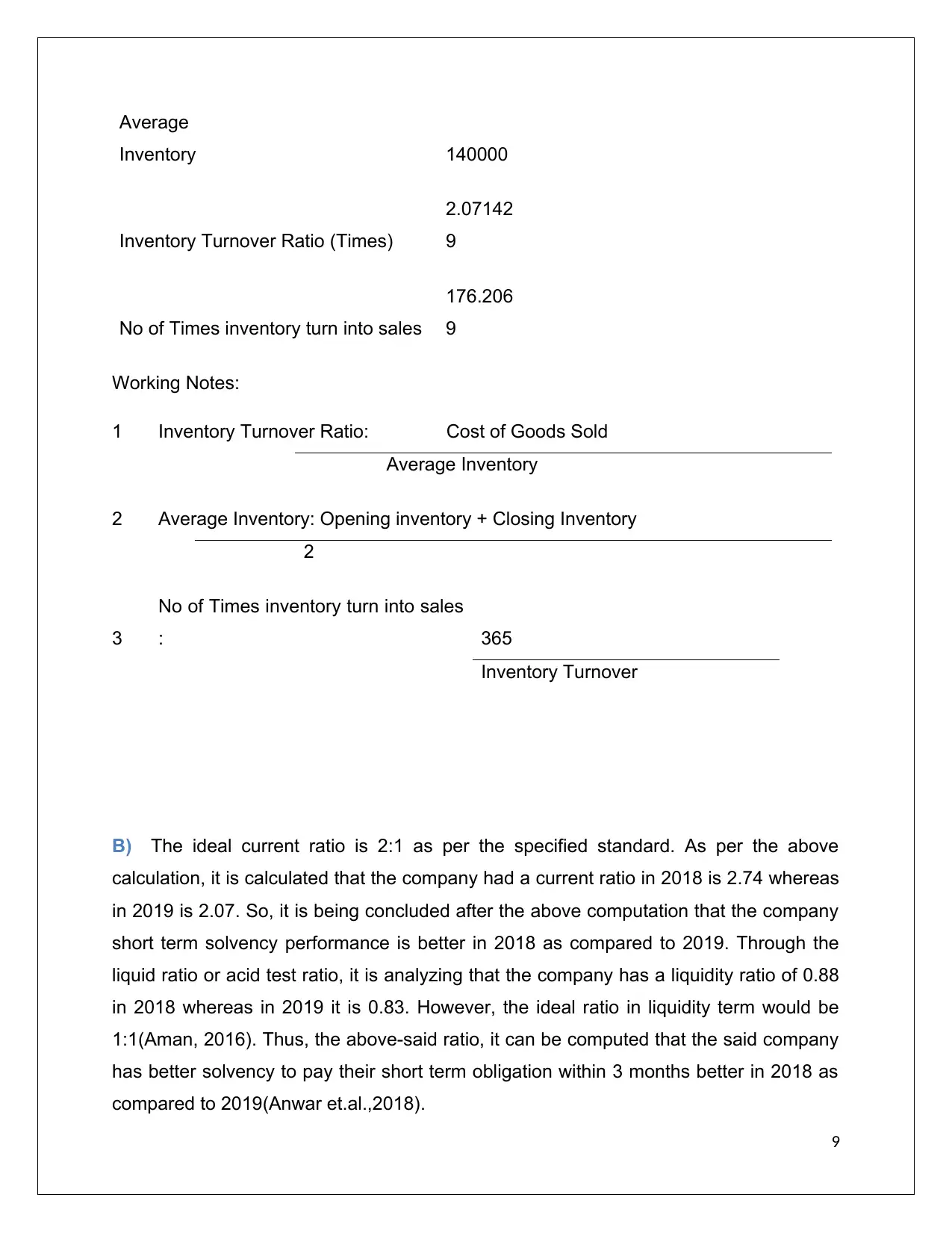
Average
Inventory 140000
Inventory Turnover Ratio (Times)
2.07142
9
No of Times inventory turn into sales
176.206
9
Working Notes:
1 Inventory Turnover Ratio: Cost of Goods Sold
Average Inventory
2 Average Inventory: Opening inventory + Closing Inventory
2
3
No of Times inventory turn into sales
: 365
Inventory Turnover
B) The ideal current ratio is 2:1 as per the specified standard. As per the above
calculation, it is calculated that the company had a current ratio in 2018 is 2.74 whereas
in 2019 is 2.07. So, it is being concluded after the above computation that the company
short term solvency performance is better in 2018 as compared to 2019. Through the
liquid ratio or acid test ratio, it is analyzing that the company has a liquidity ratio of 0.88
in 2018 whereas in 2019 it is 0.83. However, the ideal ratio in liquidity term would be
1:1(Aman, 2016). Thus, the above-said ratio, it can be computed that the said company
has better solvency to pay their short term obligation within 3 months better in 2018 as
compared to 2019(Anwar et.al.,2018).
9
Inventory 140000
Inventory Turnover Ratio (Times)
2.07142
9
No of Times inventory turn into sales
176.206
9
Working Notes:
1 Inventory Turnover Ratio: Cost of Goods Sold
Average Inventory
2 Average Inventory: Opening inventory + Closing Inventory
2
3
No of Times inventory turn into sales
: 365
Inventory Turnover
B) The ideal current ratio is 2:1 as per the specified standard. As per the above
calculation, it is calculated that the company had a current ratio in 2018 is 2.74 whereas
in 2019 is 2.07. So, it is being concluded after the above computation that the company
short term solvency performance is better in 2018 as compared to 2019. Through the
liquid ratio or acid test ratio, it is analyzing that the company has a liquidity ratio of 0.88
in 2018 whereas in 2019 it is 0.83. However, the ideal ratio in liquidity term would be
1:1(Aman, 2016). Thus, the above-said ratio, it can be computed that the said company
has better solvency to pay their short term obligation within 3 months better in 2018 as
compared to 2019(Anwar et.al.,2018).
9
⊘ This is a preview!⊘
Do you want full access?
Subscribe today to unlock all pages.

Trusted by 1+ million students worldwide

10
Paraphrase This Document
Need a fresh take? Get an instant paraphrase of this document with our AI Paraphraser
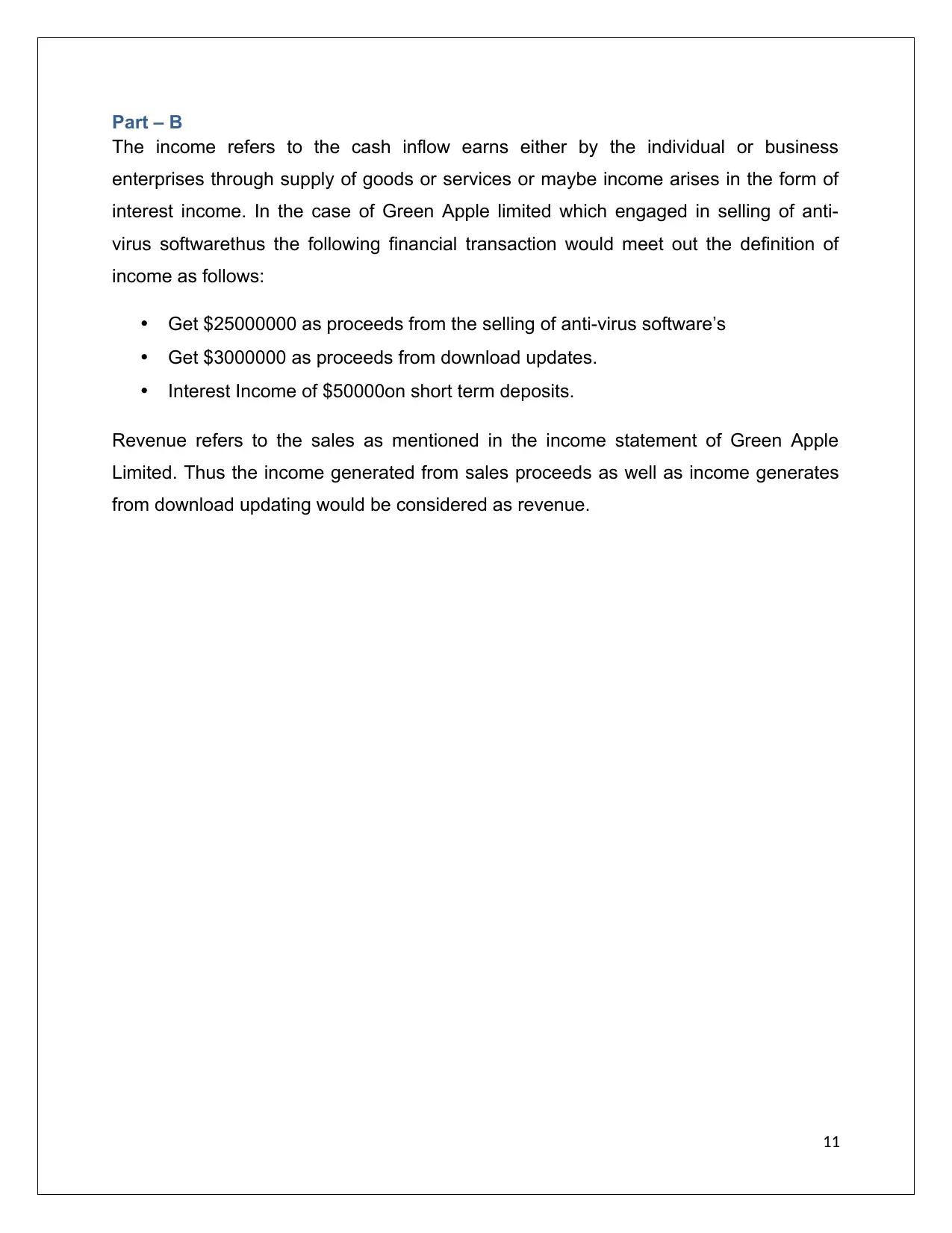
Part – B
The income refers to the cash inflow earns either by the individual or business
enterprises through supply of goods or services or maybe income arises in the form of
interest income. In the case of Green Apple limited which engaged in selling of anti-
virus softwarethus the following financial transaction would meet out the definition of
income as follows:
Get $25000000 as proceeds from the selling of anti-virus software’s
Get $3000000 as proceeds from download updates.
Interest Income of $50000on short term deposits.
Revenue refers to the sales as mentioned in the income statement of Green Apple
Limited. Thus the income generated from sales proceeds as well as income generates
from download updating would be considered as revenue.
11
The income refers to the cash inflow earns either by the individual or business
enterprises through supply of goods or services or maybe income arises in the form of
interest income. In the case of Green Apple limited which engaged in selling of anti-
virus softwarethus the following financial transaction would meet out the definition of
income as follows:
Get $25000000 as proceeds from the selling of anti-virus software’s
Get $3000000 as proceeds from download updates.
Interest Income of $50000on short term deposits.
Revenue refers to the sales as mentioned in the income statement of Green Apple
Limited. Thus the income generated from sales proceeds as well as income generates
from download updating would be considered as revenue.
11
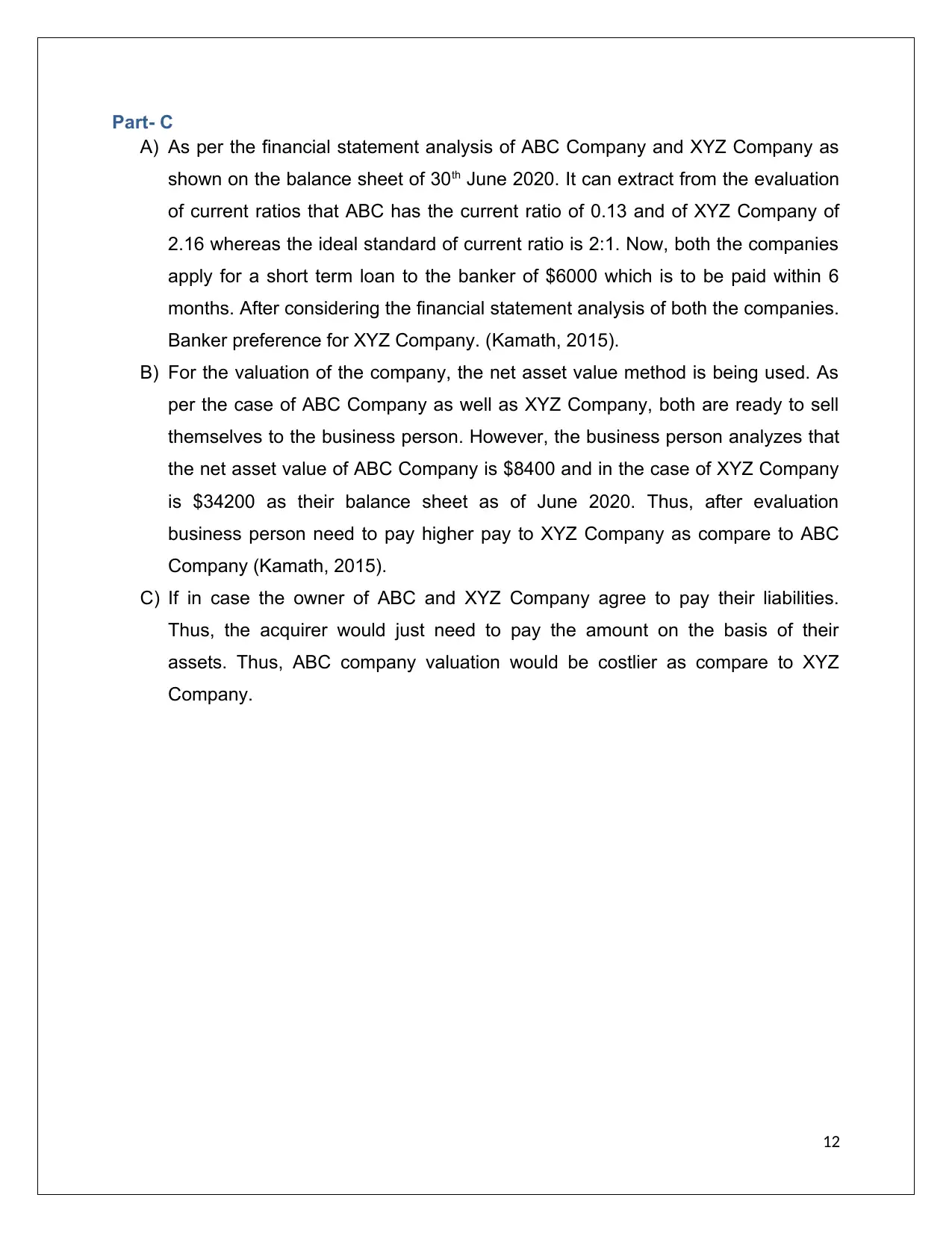
Part- C
A) As per the financial statement analysis of ABC Company and XYZ Company as
shown on the balance sheet of 30th June 2020. It can extract from the evaluation
of current ratios that ABC has the current ratio of 0.13 and of XYZ Company of
2.16 whereas the ideal standard of current ratio is 2:1. Now, both the companies
apply for a short term loan to the banker of $6000 which is to be paid within 6
months. After considering the financial statement analysis of both the companies.
Banker preference for XYZ Company. (Kamath, 2015).
B) For the valuation of the company, the net asset value method is being used. As
per the case of ABC Company as well as XYZ Company, both are ready to sell
themselves to the business person. However, the business person analyzes that
the net asset value of ABC Company is $8400 and in the case of XYZ Company
is $34200 as their balance sheet as of June 2020. Thus, after evaluation
business person need to pay higher pay to XYZ Company as compare to ABC
Company (Kamath, 2015).
C) If in case the owner of ABC and XYZ Company agree to pay their liabilities.
Thus, the acquirer would just need to pay the amount on the basis of their
assets. Thus, ABC company valuation would be costlier as compare to XYZ
Company.
12
A) As per the financial statement analysis of ABC Company and XYZ Company as
shown on the balance sheet of 30th June 2020. It can extract from the evaluation
of current ratios that ABC has the current ratio of 0.13 and of XYZ Company of
2.16 whereas the ideal standard of current ratio is 2:1. Now, both the companies
apply for a short term loan to the banker of $6000 which is to be paid within 6
months. After considering the financial statement analysis of both the companies.
Banker preference for XYZ Company. (Kamath, 2015).
B) For the valuation of the company, the net asset value method is being used. As
per the case of ABC Company as well as XYZ Company, both are ready to sell
themselves to the business person. However, the business person analyzes that
the net asset value of ABC Company is $8400 and in the case of XYZ Company
is $34200 as their balance sheet as of June 2020. Thus, after evaluation
business person need to pay higher pay to XYZ Company as compare to ABC
Company (Kamath, 2015).
C) If in case the owner of ABC and XYZ Company agree to pay their liabilities.
Thus, the acquirer would just need to pay the amount on the basis of their
assets. Thus, ABC company valuation would be costlier as compare to XYZ
Company.
12
⊘ This is a preview!⊘
Do you want full access?
Subscribe today to unlock all pages.

Trusted by 1+ million students worldwide
1 out of 14
Related Documents
Your All-in-One AI-Powered Toolkit for Academic Success.
+13062052269
info@desklib.com
Available 24*7 on WhatsApp / Email
![[object Object]](/_next/static/media/star-bottom.7253800d.svg)
Unlock your academic potential
Copyright © 2020–2026 A2Z Services. All Rights Reserved. Developed and managed by ZUCOL.





